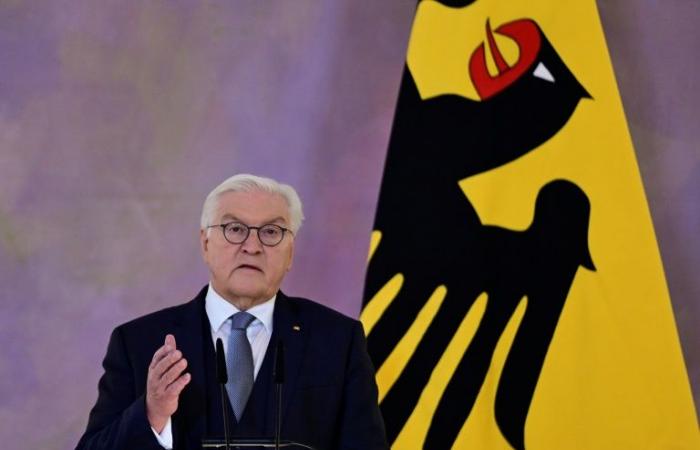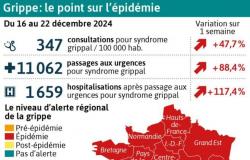Germany officially entered the electoral period on Friday with President Frank-Walter Steinmeier’s decision to dissolve parliament and set early legislative elections for February 23, in a context of economic crisis.
This two-month campaign, brought forward by seven months compared to the date initially planned, is the consequence of the implosion of the government coalition of Social Democratic Chancellor Olaf Scholz.
The conservatives of the CDU led by Friedrich Merz are clearly the winners, with 32% of voting intentions, ahead of the far-right Alternative for Germany party (AfD, 19%), the SPD (15%) and the Greens. (13%), according to a weighted average of polls as of Friday.
Given the current state of forces, a future government led by the conservatives, in coalition with the SPD as an ally, constitutes the most likely scenario.
While waiting for the formation of this future government, Mr. Steinmeier recalled that German democracy worked “even in periods of transition”.
Government and parliament remain operational until their successors are in place. But due to lack of a majority, the executive cannot decide on new projects without the support of the opposition.
Formed by the SPD, the Greens and the liberals of the FDP, the alliance in power since the end of 2021 was shattered on November 6 with the dismissal by Olaf Scholz of the liberal Finance Minister. Reason: disputes that have become insurmountable over economic and budgetary policy.
Without a parliamentary majority since then, the chancellor had asked the question of confidence in the Bundestag in mid-December with the aim of losing it and launching the procedure for early elections, the date of which Mr. Steinmeier confirmed on Friday.
– “Difficult times” –
This rare event is part of the serious crisis facing Europe’s largest economy, once a model of political stability, at a time when its privileged partner in the EU, France, is also weakened by the absence of a parliamentary majority. .
“Especially in difficult times like now, stability requires an effective government and reliable majorities in parliament,” Frank-Walter Steinmeier emphasized during his speech.
According to the head of state, the early vote must make it possible to respond to the “challenges of our time”, chief among them “the uncertain economic situation”.
Threatened with a second annual recession in a row, Germany is facing a challenge to its industrial model.
Olaf Scholz advocates a relaxation of debt rules to make investments in order to revive the economy, while the conservative opposition pleads for maintaining the debt brake, a mechanism anchored in the Constitution.
– The shadow of Magdeburg –
Among other major concerns for Germany, Mr. Steinmeier cited “wars in the Middle East and Ukraine” as well as “issues of immigration control and integration, and climate change.”
The right and the far right have forged a link between immigration and security after the car-ramming attack on the Magdeburg Christmas market on Friday, December 20, which left five people dead and more than 200 injured.
After this attack attributed to a 50-year-old Saudi refugee, the AfD organized a demonstration on site, demanding to “close the borders” in the face of “madmen from all countries”.
“We do not want such (potential) criminals in our country!” Friedrich Merz wrote in a letter to his subscribers on Friday, stressing that “the number of serious crimes committed by migrants in Germany has been increasing for around ten years. ‘years”.
Under pressure, the government promised a rapid and thorough investigation to clarify possible errors by authorities in preventing the attack. And Olaf Scholz called on the Germans to “stick together”.
“Hate and violence must have no place in this electoral campaign,” urged Mr. Steinmeier, expressing the hope that it be “conducted with fair and transparent means.”
The guarantor of the institutions pointed the finger at “external influence” without naming Russia, regularly accused of orchestrating disinformation campaigns to defend candidates who would be favorable to it in Europe.
He explicitly targeted the X platform, where this interference is expressed, according to him, “in an open” and “particularly intense” manner.
Do you have a real estate project in mind? Yakeey & Médias24 help you make it happen!






